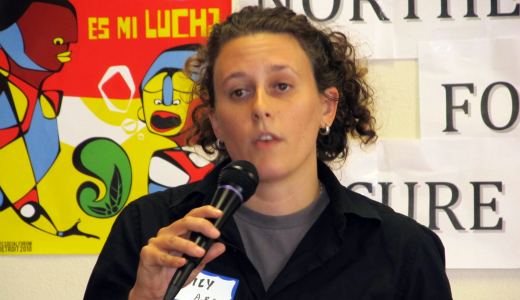
OAKLAND, Calif. – Concern is rising rapidly among immigrant communities and civil liberties advocates, as law enforcement agencies step up sharing of personal information garnered from individuals through programs such as the controversial Secure Communities (S-Comm) and the rapidly expanding Next Generation Identification project.
An overflow crowd gathered Aug. 27 for a forum conducted largely in Spanish, where they shared concerns about S-Comm’s’ devastating effects on families and friends and projected fight-back actions, including backing state legislation to let counties opt out of S-Comm.
Under S-Comm, attorney Angela Chan of the Asian Law Caucus told the audience, fingerprints of people stopped by local law enforcement are forwarded first to the State Identification Bureau and then to the Federal Bureau of Investigation (FBI), which in turn sends the prints on to Immigration and Customs Enforcement (ICE). ICE then runs the prints to see if an immigration issue exists.
“Over 120,000 people have been deported under S-Comm in the last couple of years,” Chan told the crowd. California leads the nation, with more than 46,000 deported in the last couple of years. “A lot of them do not have criminal convictions, or were arrested on minor offenses, and those arrested for more serious offenses may not have committed them,” she said.
Among the hardest hit, she said, have been victims of domestic violence, who may themselves be tagged for deportation when they seek protection from their abusers.
Lily Haskell of the San Francisco-based Arab Resource and Organizing Center highlighted the dangers of the national, multiple-agency Joint Terrorism Task Force, under whose auspices police officers can follow the same practices as FBI agents, including entrapping people, infiltrating mosques and terrorizing people.
Those telling their personal stories included undocumented “Dream Act” students from the University of California at Berkeley, who shared their concerns about family members.
“I have such a supportive community to stand up for me,” said one. “But I am always afraid when my father gets behind the wheel, even driving to pick up my mom, or going to the grocery store. He could be pulled over for any arbitrary reason and his fingerprints sent to ICE. It’s such a terrible tragedy that this supposed program could separate my family at any point.”
Among a number of local elected officials participating were Berkeley City Councilmembers Jesse Arreguin and Kriss Worthington, and representatives of U.S. Rep. George Miller, Assemblymembers Tom Ammiano and Nancy Skinner, and Alameda County Supervisor Wilma Chan.
When S-Comm began in 2008, states and counties understood they could decide whether to participate, but ICE now asserts the program is mandatory. Massachusetts, Illinois and New York, and several counties around the country, are trying to opt out, while Washington state, Washington D.C. and Pennsylvania said earlier they wouldn’t participate.
In California, Assemblyman Tom Ammiano, D-San Francisco, has introduced the TRUST Act (Transparency and Responsibility Using State Tools), AB 1081, to make S-Comm an “opt-in” program for the state’s counties, with safeguards against racial profiling and wrongly targeting individuals. The bill is now before the state Senate.
Actions proposed at the forum included a 48-hour vigil at the state capitol, mass marches of people affected by S-Comm – especially women and children, demanding that candidates for election pledge to oppose S-Comm, and urging Gov. Jerry Brown and Attorney General Kamala Harris to reject S-Comm and support passage of the TRUST Act.
Speakers saw President Obama’s recent announcement that immigration enforcement would focus on people with serious criminal records as a first step toward a thorough and fair immigration reform.
S-Comm is part of a broader, emerging information-sharing program, Next Generation Identification, which civil liberties advocates call an even bigger threat because it will expand data collection to palm prints, iris scans and other biometric information, and share information with other federal agencies without a person’s knowledge.
Photo: Lily Haskell of the Arab Resource and Organizing Center. Marilyn Bechtel/PW












Comments